Katie McLaughlin’s Resurgence Fueled by New Perspective
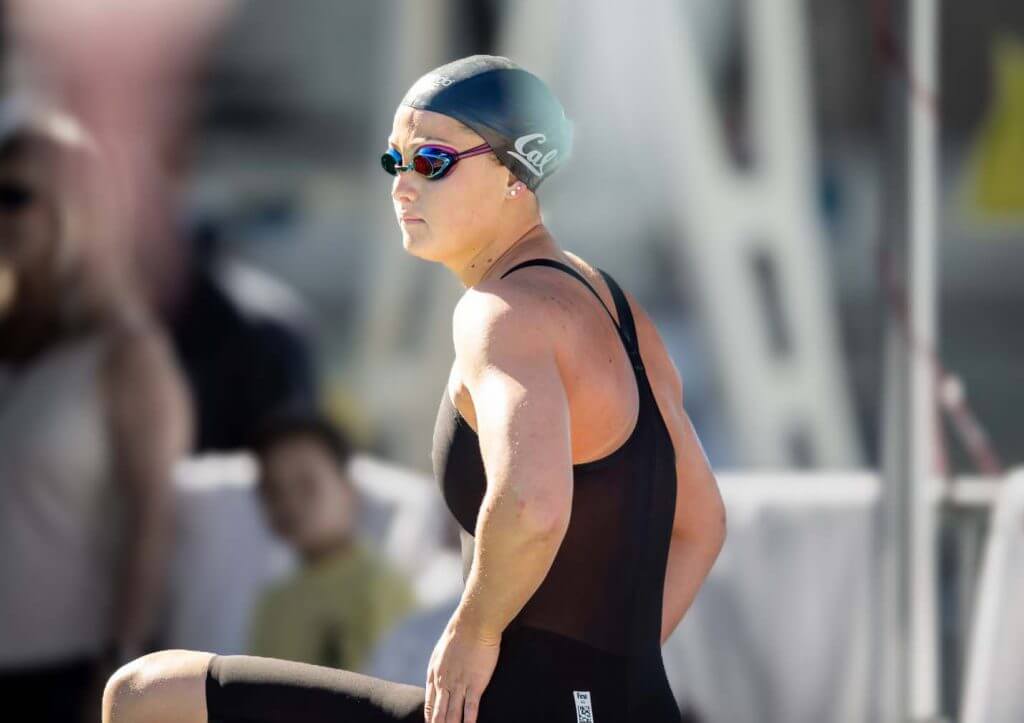
By David Rieder.
Amid a long swim meet, momentum can be too strong a force to overcome. Start off strong, and fatigue can’t squelch the resulting upswell of positivity. But open up with a rough performance, and it may be hard to rebound, to stay positive for the important races to come.
This summer at U.S. Nationals, Katie McLaughlin dealt with a double whammy on day one. The meet’s very first race was the 200 fly, previously McLaughlin’s signature race and the one where she was a World Championship finalist just three years ago. McLaughlin finished 10th. Minutes later in the 100 free, the 21-year-old ended up 11th.
That meant two of her stronger events were over with no championship finals appearances to show for them. Not that the swims were by any means poor—particularly her 54.55 in the 100 free. “It just wasn’t necessarily what I wanted,” McLaughlin said.
“There are a lot of things in my swimming that I have been working on and working towards,” McLaughlin said. “I think I have been improving, and at that point, it maybe didn’t reflect in the time, but coming out of those, I didn’t want to tell myself that they were bad. I think I was just a little bit frustrated and motivated for my next ones.”
That afternoon, McLaughlin was at a crossroads—and she refused to let the negative emotions from those first two swims spoil the entire meet. Always a social being, McLaughlin focused on enjoying the parts of the meet that didn’t involve swimming. Behind the blocks before her races, she reminded herself that there was no reason she should feel pressure.
“I just reminded myself that I swim because it’s fun for me and not because I have to do it and I’m lucky to have the opportunity, rather than ‘I have to do this or else,’” McLaughlin said. “It’s just taking every race like, ‘Okay, let’s see what I have right now or what I can do right now,’ rather than thinking that every race is going to define my swimming career.”
So McLaughlin kept her cool. She grinded through the next few sessions of the meet and pulled out a pair of consolation final wins. And then on the fourth day, she put together the kind of swim that she wouldn’t let herself think about, the sort of performance that had eluded her for years.
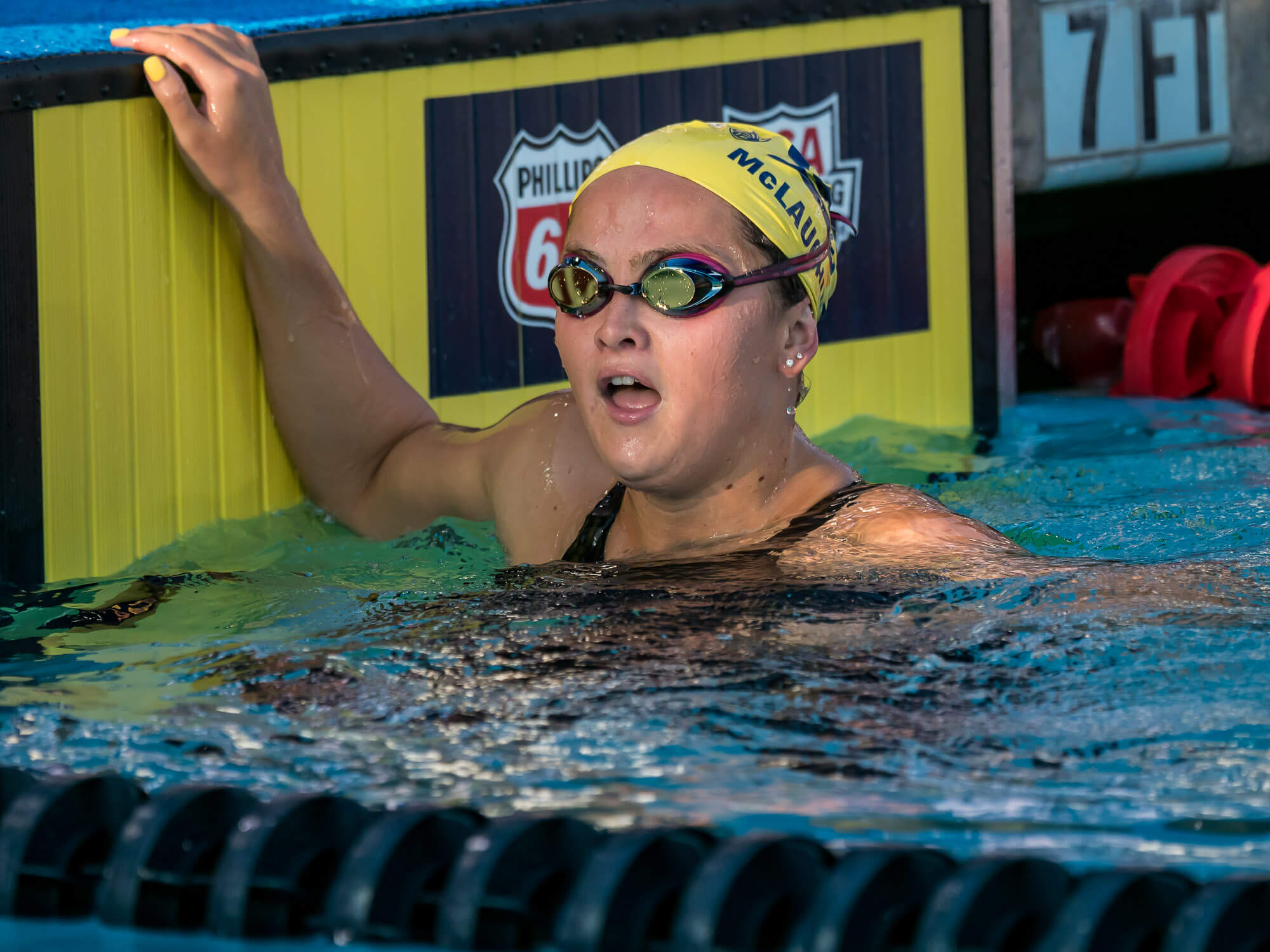
Photo Courtesy: Peter H. Bick
Because it wasn’t just one disappointing late July morning that was so frustrating for McLaughlin. Ever since suffering a major neck injury in early 2016, she had struggled to find the form she showed in her early teenage years. She could chalk up a rough summer of 2016 to her injury and the ensuing recovery, but in 2017, she admitted, she had hoped to be better.
All that baggage vaporized when McLaughlin swam the 100 fly in Irvine.
“I was really, really excited for the 100 fly, so I knew going into that day that that was my best chance and the one I was most excited for,” she said. “It was pretty easy to get back up when my favorite event and one that I was really looking forward to was coming up.”
After qualifying for that final and racing in lane three, McLaughlin’s face showed pure elation and joy—as did the faces of her Cal teammates standing on the side of the pool. She had finished in 57.51, faster than she had ever swum before—and as the runner-up, she had secured a trip to the Pan Pacific Championships.
===
The trip to Pan Pacs was familiar terrain for the now-21-year-old McLaughlin. Back when she was 17, the 2014 edition of the meet in Gold Coast, Australia, was her first exposure to senior international racing, and she was the bronze medalist in the 200 fly at that meet. This time around, she finished ninth in the 100 fly—with the fourth-fastest time of the meet—and in the 200 free, and she helped the American women to a silver in the 4×200 free relay.
No, McLaughlin hadn’t qualified to swim the 200 free, but given the choice to swim anything she wanted, she ended up racing the individual event in prelims on a whim. She ended up swimming under 1:57 for the first time.
“The 200 free has always been one of my events and something I definitely like to train for and race, but I didn’t really expect to go that fast at Pan Pacs,” McLaughlin said. “Before the meet, (Cal coach) Teri (McKeever) and I were talking about it, and we figured that I would swim it, take every opportunity I can. If it doesn’t go well, that’s okay—we have more coming down the line.
“I think that’s also maybe why I had a good swim, because I didn’t really have much pressure. I was really just doing it to race. I think that’s really awesome and something about our sport that I need to tap into when I race, just enjoying it and racing to race.”
And so McLaughlin ended up on the 4×200 free relay, and she swam the third leg, directly after Leah Smith and before Katie Ledecky. Ironically, she also appeared on that relay at the 2015 World Championships—where she swam the second leg, directly after Smith and directly before Ledecky.
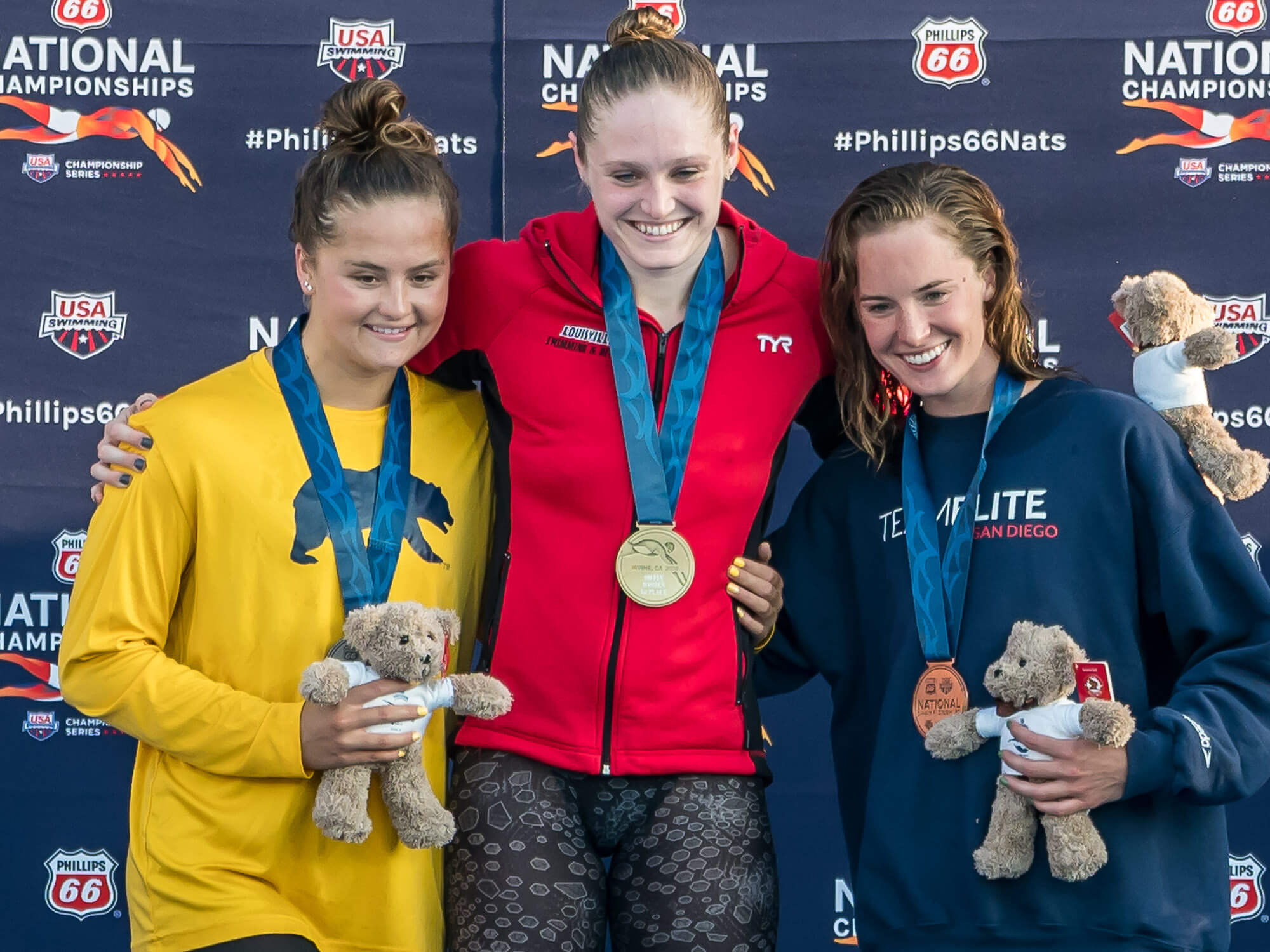
McLaughlin, Kelsi Dahlia and Kendyl Stewart after the 100 fly at U.S. Nationals — Photo Courtesy: Peter H. Bick
But that trio’s relay reunion did not mean that all was the same as it had been three years earlier. Back then, McLaughlin was preparing to enter her freshman year at Cal. After this year’s Pan Pacs, she returned to Berkeley for her senior year and some knowledge that she didn’t have back in 2015—that swimming isn’t a straight-line progression.
Ask McLaughlin what she wants to accomplish in her final year as a Cal Bear, and she won’t mention times or championships. All that, she has learned, is out of her control.
“I just want to enjoy it, and whatever that means day in and day out, that’s what it is. I feel like if I say, ‘I want it to be the perfect senior year, and I want everything to go well and everyone to swim fast,’ that’s just sometimes not how it goes,” she said.
“I think just taking every day and the hard practices, and when it’s raining and freezing and we’re rolling the lane lines, just kind of slow it down and see how lucky I am to have had this experience. I am going to miss it so much, so I don’t want to take any of it for granted because it’s coming to an end, and I know when it’s done, that’s going to be hard. I don’t really have a goal because I don’t want to define it by, ‘It was successful, or it wasn’t successful.’”
That’s the perspective McLaughlin gained from the years of ups and downs—and the perspective that made this summer’s triumphant return to Pan Pacs a little bit sweeter.
More from Katie McLaughlin:
When you finished second in the 100 fly at Nationals, what did that mean to you, getting second and getting back on the Pan Pacs team?
“That was really awesome. I think the best part of that was the support of my teammates. I was very happy for myself, obviously, but looking over and seeing my team and Teri being just as excited as me was honestly very cool.
“It is my swimming, but I am a big team person, and I think every one of my teammates knows that they mean as much to me as my swims do and how much they have helped me, I hope they know. That’s what made it very cool, how excited my team was. Yeah, maybe it was my performance, but I think it really says a lot about Cal and our program, I think.”
What was it like to be on the U.S. team, be at Pan Pacs—how was that different from being an 18-year-old at Worlds or a 17-year-old at Pan Pacs four years ago? A lot has happened—life has happened—and you were in a similar situation.
“No matter what meet it is—I don’t know if this sounds cliché—but I think me as a swimmer now is different from me in high school. It’s not necessarily that I was bad in high school—I’ve just grown a lot since high school. I think my experience at Pan Pacs this time was different than my experience at Worlds or Pan Pacs in high school, just because I have grown so much as a person.
“I think every meet I’m at now is different from what it was back then. I don’t think it was because it was Pan Pacs or Worlds that it felt different. I think I’ve really grown as a person and a swimmer, and that’s why it felt different.”
How specifically do you think you’ve grown as a person and a swimmer in the last three years?
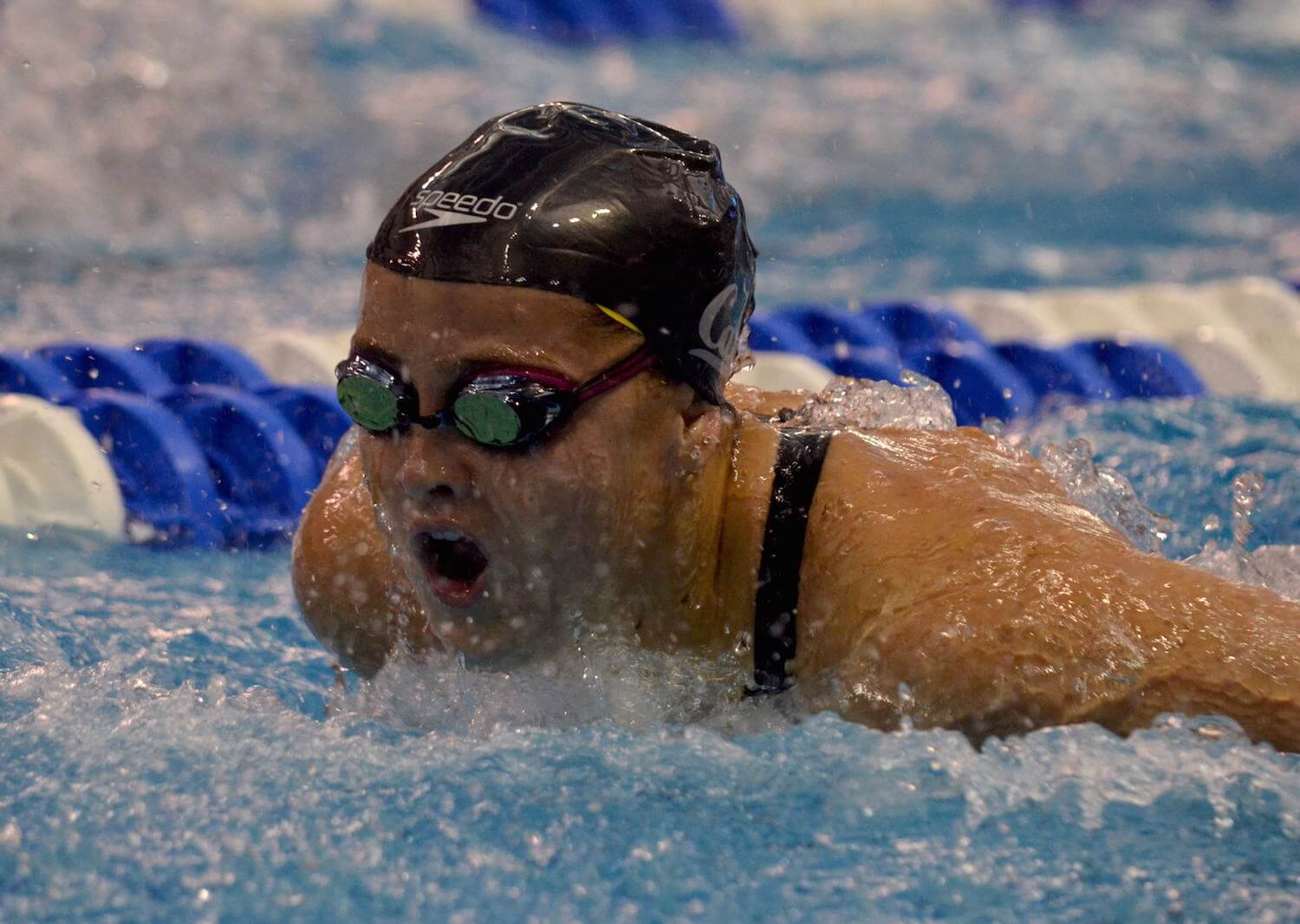
Photo Courtesy: Dan D’Addona
“I think I just know myself more and my body. I think I can take ownership more of what I’m doing as a swimmer and a person and spend my time in the right ways. Obviously, moving away from home is a big change, so I’ve learned everything, from nutrition to sleep and when to do laundry and figuring out the little things about everyday life. I think I’ve been able to grow in that way and also as a swimmer and a person generally.
“I feel like I’ve just been able to figure it out a little bit more, if that makes sense—figure it out training-wise or what I need to do when I’m faced with a conflict or if something doesn’t go my way, not beat myself up over it but learn how I need to recover from that. You know what I mean? Just learning how to treat myself and the people around me and my body and everything.”
It’s not that you care less—correct me if I’m wrong—it’s that you have more perspective and big picture?
Yes. 100 percent.
And that’s just from life?
“Yeah, definitely. Just as a college student and especially at Cal, being surrounded by some of the smartest people in school and also the best athletes, the best swimmers in the country, it just gives you a little bit of perspective. And what I have been through with my injury and stuff, I think that also gave me a lot of perspective, figuring out what’s important to me.
“Swimming is very important to me, and being successful obviously is very important, and I’m going to do everything I can to be the most successful I can. But if not, knowing that that doesn’t define me… It does matter to me, and that’s what important to know, that it does matter to me, and I don’t have to be a swimmer or do anything specific just because other people want me to.
“That being said, I am on a team, which is very, very important to me, and that helps me also gain perspective. If I want to be better, I’m lifting the people around me, too, and if I see others around me doing better in school and life and as a person in swimming anything, that also can help me. I think it all has given me perspective, looking at the big picture and what I’ve gained from this sport.”
How did being at Pan Pacs feel the same as it did three or four years ago? What was similar?
“A lot of the people were obviously the same. Getting to spend time with a lot of people that I usually just see for three or four days at a meet that are some of my really good friends like Leah (Smith), that was the same where that was something I definitely missed the past few years not getting to go on these trips. When I got to this summer, it felt the same as it had been, just picking up where everything left off.”
Of the whole summer, what was the most gratifying moment? Was it seeing your teammates after you made the team at Nationals?
“I think so. And Teri got named to be one of the coaches at Pan Pacs. I think that was definitely one of the best things for me because with what I have been through and my experience at Cal, Teri has, through the bad and the worst and the ugly and the hard, been with me every step of the way.
“It was awesome that when I finally broke back through to where I want to be, she got to be there with me because she has worked just as hard as I have to help me get back on my feet, so I think that definitely was one of the coolest things.”
People talk about comebacks, but other than the few months when you couldn’t swim, you never went anywhere. There was the sense that you couldn’t break back to that level. What are you most proud that you got past of all the difficulties that you’ve had in the past two years?
“I think honestly the most proud that I still love swimming and that I don’t feel like I have to do anything to prove anything to anyone. I swim because I genuinely enjoy it and I love to race and I love my teammates. That’s what I’m really proud of, that I fought through some hard times for myself and my team and Teri and everyone in my life that supports me and has been around me.
“There were definitely some times where it was really hard, and I felt pressure that, if I don’t do well, people are going to look bad at Cal or at Teri because I struggled. Looking at the big picture, it doesn’t matter what others think. It’s really about the people around me who support me. Just taking every day and enjoying what I’m doing and not worrying how that affects the outside world.”
So you’re most proud that you didn’t let the bad things define you?
“Yeah.”
How did you stay in the position where you genuinely enjoyed swimming? Were there times when you didn’t and you had to work for that?
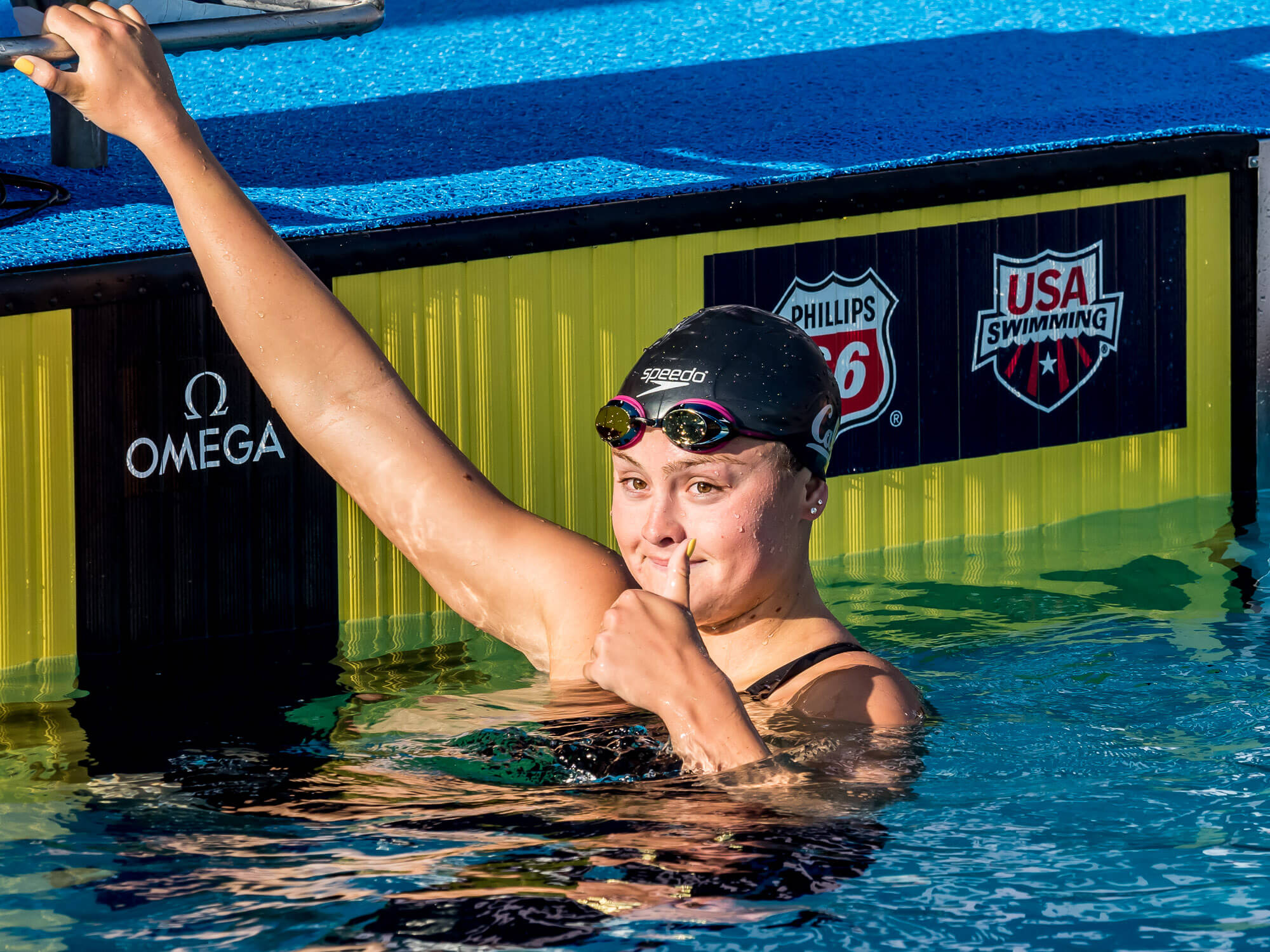
Photo Courtesy: Peter H. Bick
“I don’t think there was ever necessarily a time when I hated swimming, but I think there was a time when I was very frustrated with it. I never despised it because it’s given me so much in my life that I can’t hate it. I think it was just frustration with swimming.
“I don’t even know if it was with swimming but just myself, kind of, sometimes, when I was struggling with it. ‘I am training really hard—why am I not performing like I want to?’ I think that was kind of a struggle, but it was never resentment towards swimming or anything like that.”
The 100 fly-200 free double (at NCAAs)—I assume you’ll do that again?
“I don’t know. Maybe? It kind of depends on how my season goes. To be honest, at this time last year, I thought I was for sure doing the 500 at NCAAs. So it really depends. I kind of enjoyed doing it—it was a kind of a fun challenge because, ‘Why not?’
“Yeah, it was definitely hard, but that’s okay. Racing is going to be hard. It’s going to hurt. We’ll see. I’m open to doing it again for sure, but we’ll see if that’s what I’m doing well in at the moment.”
What are the keys to successfully pulling off that double?
“I think I was very lucky that I got to be in the A-final for both because I did have a few extra minutes (to rest) while the B-final was going. Qualifying in the morning, dropping to eighth (in the 200 free), no matter what my time was, the worst I could do was eighth, so I think the best thing for that was taking the 100 fly and doing the best I could, and in the 200 free, also doing the same thing with a little less power behind it because I was a little tired. I think taking it one at a time. I don’t know how it would have looked if I had gotten ninth in the morning in the 200 free instead of eighth. That definitely was a key there, a few extra minutes.”
How about between races? Is there some magic sauce to doing that?
“I warmed down a few laps, my teammate brought me some water, Teri came over and capped me, and then it was ready for the next one. It was cool—I didn’t walk out because I didn’t have time to walk over to the ready room, and I was in lane eight, so everyone walked by me. Robin (Neumann), one of my teammates, was in the heat, and so she walked by, and we were like, ‘Let’s go!’ So that was also a little uplifting for me.”
What’s the vision for the rest of your swimming career? Does it go past March?
“Yeah, definitely. I’m swimming next summer for sure because I made the Worlds team, so I’m going to that. And then I’m going to stay up here at Cal and train through Trials at least. I have another semester of school, so I’ll be here training and then kind of just taking it by ear then, so we’ll see.”
You talked about not wanting to make your career about success vs. failure, so do you just want to put in everything you can and hope for the best and enjoy it? Is that what it’s about for as long as you do this?
“Yeah, I think so. As long as I’m still enjoying waking up and going to practice and challenging myself and finding new ways to be better, I think that’s important. There’s a lot of things in life that I want to do that are outside of swimming, so I think if at any point if I want to do that instead, I don’t want to be bound to it, but I definitely still love swimming and don’t want to be done any time soon as of now. So we’ll see. I definitely have until Trials in me, and then we will see.”
What’s after swimming for you?
“I don’t know—I’m kind of thinking about a lot of things. I’ve been thinking about maybe going to some sort of grad school for education and being a teacher. I’ve also always to be an event planner, so there’s that. And then there’s like—I don’t know. We’ll see.
“I’d like go to grad school in something, whether it’s education or something else and seeing whether I like it and not feeling pressure to decide on what I want to do for my life. And I guess that’s maybe not a very organized way to look at my life, but whenever I feel like I want to move on from something, I don’t want to feel bound to it. We’ll see where that takes me.”
What are some things outside of the pool that you really enjoy doing?
“I really enjoy going to SoulCycle. That’s like my me time. When I’m having a rough day, I just go and do a little spin class and sweat it out. I also really enjoy spending time with my friends and family. It doesn’t have to be doing anything in particular.
“I’m not really a musician or an artist—I’m really bad at drawing—so nothing like that. I guess that’s a little boring. Just spending time with my friends and family—I’m more of a social person, so I like being around people. Going to the beach or playing in the ocean. I like going on road trips—that’s always fun.”
It’s not often you hear an athlete at the level you are saying they like extra workouts.
“I get that. I understand. It’s a fun workout. It’s a hard workout, but it’s fun. It cleanses your brain. And there’s no pressure—you just go and workout, and then it’s over.”
.jpg)
- 2019 WOMEN'S FULL RESULTS
- 2019 MEN'S FULL RESULTS
- 2020 WOMEN'S FULL RESULTS
- 2020 MEN'S FULL RESULTS
- 2021 WOMEN'S FULL RESULTS
- 2021 MEN'S RESULTS - DAY 1
- 2021 MEN'S RESULTS - DAY 2
- 2021 MEN'S RESULTS - DAY 3
- 2021 MEN'S RESULTS - DAY 4
- 2022 WOMEN'S FULL RESULTS
- 2022 MEN'S FULL RESULTS
- 2023 WOMEN'S FULL RESULTS
- 2023 MEN'S FULL RESULTS
- 2024 WOMEN'S FULL RESULTS



